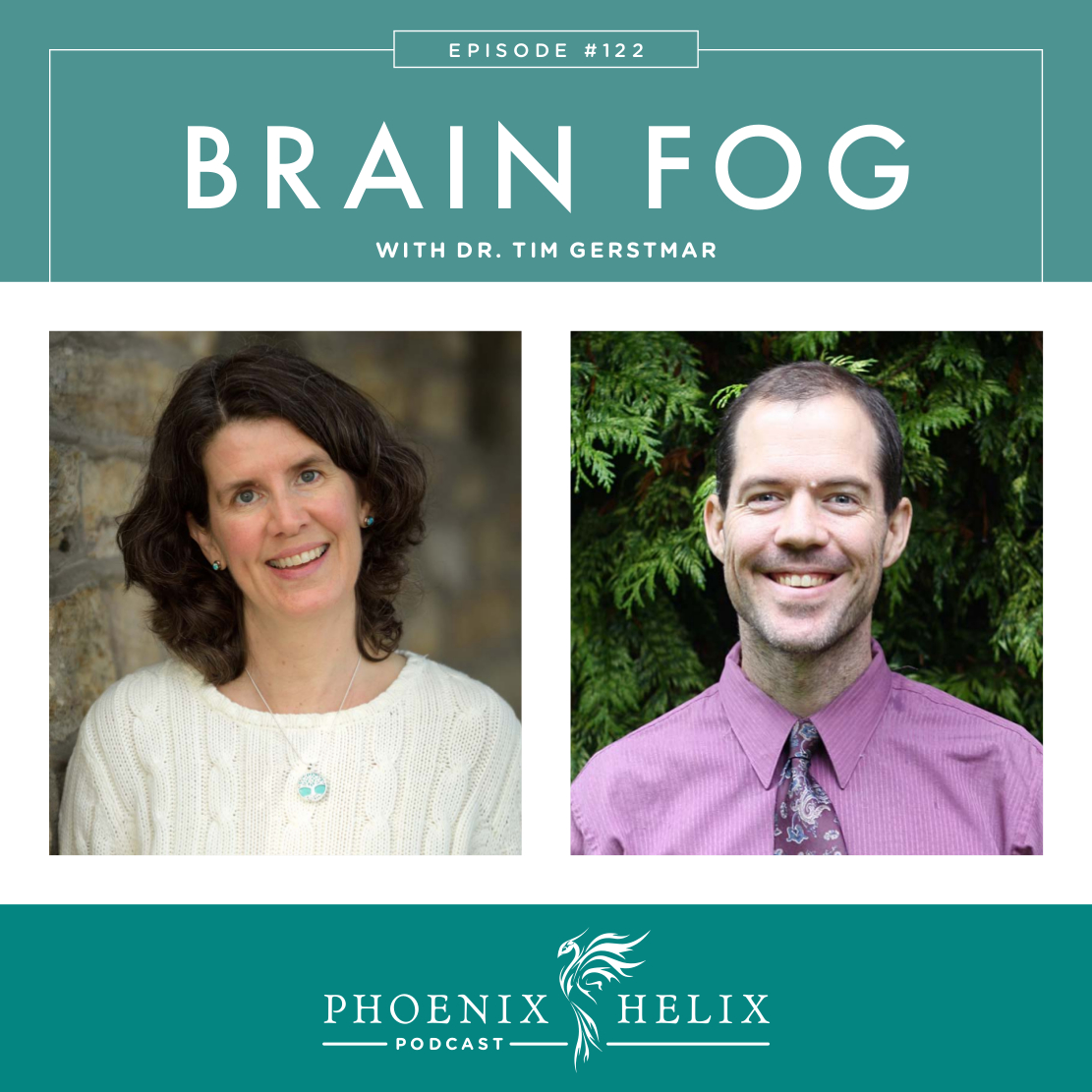What Is Brain Fog?
Do you ever feel like your brain isn’t working quite right – that you can’t remember things, or think clearly, or focus and make decisions? That simple tasks feel challenging, and complex tasks feel impossible? This cluster of symptoms is often called Brain Fog, because that’s what it feels like – that there’s a fog bank surrounding your brain, making everything more difficult. It’s also common to feel physically clumsy on brain fog days as well. Today, we’re doing a deep dive into the root causes of brain fog, and how we can identify and treat them. Our guest is Dr. Tim Gerstmar, ND.
Listen to the Show
- Subscribe to my podcast through your favorite podcast app: iTunes, Stitcher, Google, TuneIn, Spotify, Amazon, etc.
- You can also listen to the episode right here through the player below, and if you subscribe to my newsletter you’ll get notified of future episodes.
Podcast: Play in new window | Download
Show Notes
- Intro (0:00)
- Welcoming a New Podcast Sponsor: Wild Zora (3:04)
- A paleo food company that specializes in dehydrated foods, including delicious meat & veggie bars, instant soups, camping meals, and cold-steeped instant teas. Their goal is to fuel people for health, travel, and time outdoors.
- I’ve been a fan of Wild Zora since 2015, when they first reached out to tell me about their company. At that time, they had no AIP offerings, so I told them about the paleo autoimmune protocol. Their response was to create a meat & veggie protein bar just for us! That was the Mediterranean Lamb bar which quickly became one of my favorite travel snacks. Since then, they’ve created an entire AIP line, which includes another meat & veggie bar: Apple Pork, an instant soup: Lemon Chicken, and two dehydrated camping meals: Summit Savory Chicken and Mountain Beef Stew.
- Place an order here, and use the code PHOENIX for 10% off your first order.
- Meet Dr. G (4:55)
- Dr. Tim Gerstmar is a naturopathic doctor trained through the world-renowned Bastyr University, where he is now a member of the faculty. He also has a clinical practice in Redmond, Washington, called Aspire Natural Health. His specialty is helping people with autoimmune and digestive issues, and brain fog is a common side effect of both.
- When Tim was a senior in college, his father had a massive stroke following surgery. Tim moved back home to become his primary caretaker. This gave him an inside look of the conventional medical system – its benefits as well as its limits. His father’s insurance coverage for rehabilitation ran out before he had fully recovered, so Tim started seeking alternative healthcare as well. During this time, he wished there was one holistic doctor who could guide his father’s treatment overall, but one didn’t exist. That inspired Tim to become one himself.
- After considering many avenues of medical education, he decided on naturopathic medicine.
- What Is Inflammation? (12:15)
- At its most basic, inflammation is simply an active immune system, and this is necessary for health. It’s how our body protects against things that could harm us, such as bacteria, viruses, fungi, parasites, toxicity, etc. It’s also how we heal injuries.
- However, when inflammation becomes chronic and/or inappropriate, as is the case with autoimmune disease, it interferes with the normal, healthy function of the body, upsetting hormone balance and damaging tissues. In the brain, is can disrupt brain processes, resulting in symptoms of brain fog.
- Resource Podcast: Ep. 158: Inflammation.
- Root Cause vs. Causes (16:16)
- Human beings like simple answers – that A causes B, and if you fix A, you’ll feel 100% better. And there are books, podcasts, and articles online that pander to this wish. However, human health is usually more complex than that. The root cause for one person is often very different from the root cause for another, and many of us have multiple root causes. So, in today’s podcast we’ll be looking at multiple factors than can influence brain fog symptoms.
- Gut Health & Brain Fog (18:01)
- Direct Effect: If we have food sensitivities, and we eat that food, the immune system in our gut sets off an inflammatory response. Depending on autoimmune diagnosis, this might set off an attack on the joints, thyroid, myelin sheath, etc. But it also can cause an inflammatory response in the brain.
- Indirect Effect: The food we eat also impacts the health of our microbiome. A common sign of gut dysbiosis (an imbalance in the microbiome) is brain fog. That’s because bacteria and yeast produce chemicals that enter our bloodstream and impact brain function. One extreme case is a condition called auto-brewery syndrome, where yeast in the microbiome produce alcohol and the person can actually become drunk from that alcohol. Excess sugar intake often causes gut dysbiosis.
- Resource podcasts:
- Hormone Balance & Brain Fog (23:12)
- Women’s brains need estrogen to function well. For that reason, brain fog is a common symptom of perimenopause and menopause. It’s sometimes called “meno-brain”. Some women’s brains adapt to the lower estrogen levels, but others don’t, and in those latter cases supplemental hormones can be beneficial.
- The thyroid controls the metabolism in our body, and when it’s not working properly, brain fog is one of the common symptoms.
- Adrenal fatigue can also impact brain function. Cortisol is a hormone released by the adrenal glands, and it has three major roles in the body: (1) physical energy (2) maintaining blood sugar levels (3) reducing inflammation. When it goes out balance, these functions go out of balance as well, and again – brain fog is a common symptom.
- Resource podcasts:
- Thank You to our Podcast Sponsor – Paleo on the Go (37:02)
- A frozen meal delivery service, 100% of their menu is compliant with the elimination phase of the paleo autoimmune protocol (AIP). They have over 5o items, including entrees, side dishes, broth, AIP-friendly bacon, and desserts.
- Use the code PHOENIX for 10% off your first order.
- Toxins & Brain Fog (38:52)
- External toxins: pesticides, plastics, heavy metals, chemicals, etc.
- Internal toxins: created naturally as byproducts of digestion.
- Our body has detoxification systems in place to keep us healthy, but they can become overwhelmed. When this happens, many things can be effected including hormone balance, immune function, metabolism, and brain function.
- Resource Podcasts:
- Trauma & Brain Fog (41:46)
- Physical trauma: traumatic brain injuries, concussions. Even mild concussions caused by accidents, falls, and sports injuries can kick off chronic inflammation in the brain.
- Emotional trauma: psychoneuroimmunology is a field of science which shows that thoughts and emotions do have physical manifestations. This is true for acute and chronic stress, but also traumatic experiences. When someone says “it’s all in your head“, they’re usually dismissing physical symptoms as imaginary. This isn’t accurate. What happens “in our head” has real consequences for our body, including autoimmune, digestive, and brain function. The opposite we also know to be true. What happens in our body impacts our emotional state.
- Resource Podcasts:
- Where to Begin Troubleshooting (47:07)
- The silver lining of a complex issue like brain fog with multiple potential causes is that it all interacts. So, what you do to improve one area often helps improve other areas as well.
- A detailed health history is the first step. It helps direct both testing and treatment, since every patient is unique.
- Past treatments – both failures and successes – can also provide very helpful information. They give clues on where to look next.
- Functional medicine practitioners can also get more information from standard lab work than a conventional doctor is trained to see.
- 3 Self-Experiments (53:49)
- 1. Write down your own detailed health history, and look at it like a detective. When did your symptoms first appear? What was happening in your life physically, mentally, and emotionally? With the potential root causes discussed in this podcast, which seem most likely to apply to you?
- 2. Since digestion greatly impacts brain function, if you haven’t already tried a healing diet, that’s the next intervention Dr. G recommends to all of his patients. (Resource: Comparison of 3 Healing Diets).
- 3. Supplement trials: Not only do they have the potential to help symptoms, but they can also help identify root causes.
- Curcumin is an herbal anti-inflammatory. If you try that and it improves your brain fog, that’s a sign that inflammation is involved.
- Probiotics impact the microbiome. If you try a high-quality one, and it makes you feel either better or worse (and both results can happen), it’s an indication that gut health is a root cause.
- Siberian Ginseng (Eleuthero) is an herb that supports adrenal function. If you try that and it improves your brain fog, that’s a sign that adrenal fatigue should be addressed.
- What are Nootropics? (59:04)
- These are compounds designed to optimize concentration. Dr. G puts it in the sphere of bio-hacking rather than healing. It’s not a focus of his practice. His goal is to work on removing the obstacles to optimal brain function and supporting the body overall.
- Outro (1:02:03)
- Dr. G is accepting new patients locally in Redmond, WA, and he also does phone consults with people around the world. You can connect with him through his website: Aspire Natural Health. He also has a free report on digestion and autoimmunity for my listeners. Just text the code PHOENIX to 425-651-6851.
- Special Note: Many listeners have told me they’d like to leave a positive review in iTunes but don’t know how to do it. I finished today’s podcast with a step-by-step tutorial, and I’ve also included a written tutorial below. If you take a minute to do this, I would be very grateful!
- Eileen (your podcast host) is the author of multiple books, written to help people thrive with autoimmune disease. Learn more on the Books Page.
- If you like this podcast, follow or subscribe through your favorite podcast app. You can also subscribe to Eileen’s biweekly newsletter.
- Check out the entire archive of podcast episodes.
You May Also Be Interested In
Spreading the Word
If you like the podcast, please leave a positive review in iTunes. It would mean the world to me, and also helps others find the podcast. Here are some quick instructions using your iPhone:
- If you are already subscribed to my podcast: (1) Click the purple podcast icon. (2) At the bottom of the screen, click Library. (3) At the top of the screen, click Shows. (4) Click the Phoenix Helix podcast image. (5) Scroll down the page, and you’ll see Ratings and Reviews. Scroll down a little bit more and click on Write a Review. This will bring up the review screen. Tap 5 stars (if you love the podcast), and then click in the title box, and it will bring up the keyboard. Enter a title and short review. (6) Click Send in the upper right corner. (7) Thank you! Positive reviews give the podcast a higher search ranking in iTunes, helping people find it and letting them know it’s a quality podcast and worth their time to listen.
- If you haven’t subscribed to my podcast: (1) Click the purple podcast icon. (2) In the lower right corner, click the magnifying class. (3) Type Phoenix Helix in the search box. (4) Click the podcast cover in the Show list. (5) If you’d like to subscribe, click the + sign at the top of the screen. (6) To write a review, scroll down the page, and you’ll see Ratings and Reviews. Scroll down a little bit more and click on Write a Review. This will bring up the review screen. Tap 5 stars (if you love the podcast), and then click in the title box, and it will bring up the keyboard. Enter a title and short review. (7) Click Send in the upper right corner. (8) Thank you! Positive reviews give the podcast a higher search ranking in iTunes, helping people find it and letting them know it’s a quality podcast and worth their time to listen.








